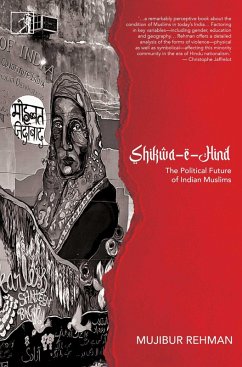Roughly 200 million today, Indian Muslims are greater than the population of Britain and France or Germany put together. According to the Indian Constitution, Indian Muslims are treated as political equals, which is what India's secular polity promised after its independence, encouraging more than 35 million Indian Muslims at the time of Partition to choose India as their motherland over Pakistan. However, the supposed relationship of equality between Hindus and Muslims as scripted in the constitution is being increasingly replaced by the domineering tendencies of a Hindu majority in India today. The author describes the current state and position of Indian Muslims (the seeds for which were sown when the BJP came to power in 2014) as the thirdpolitical moment; the second he believes was in 1947 when the community was given equal status in the Indian Constitution; and the first, was in 1857 when Indian Muslims learnt to live under the British colonial state. As he states, there is no denying that political circumstances for Indian Muslims were not completely ideal or full of democratic energy prior to the rise of the Hindu Right since the late 1980s. With numerous layers defined by language, ethnicity, region, etc., Muslims have the most heterogeneous identity, representing India's quintessential diversity. And yet, Muslims are perceived as the most enduring well-grounded threat to the majoritarian project of the Hindu Rashtra. Indian Muslims are perceived or presented as perpetrators of violence and violators of law, even if they are at the receiving end. They are viewed as an internal enemy, who need to be dealt with for political, social, historical, and ideological reasons. Going forward, the community must formulate the language of democratic rights of Indian Muslims as equal citizens and define the ethics of human dignity in their struggle to reassert their place in India's political power structures at all levels: from panchayat to Parliament. While the economic future or cultural rights of Indian Muslims have been debated since 1947, it is the political future that demands attention because only as an equal and participatory community in the politics of the nation, can economic and cultural futures be addressed. This book explores the political future of Indian Muslims in this context. From Shaheen Bagh to Hindu-Muslim riots, from the unique position of Muslim women in India to the Sachar Report and the Muslim backwardness debate, Mujibur Rehman analyses, confronts and discusses the urgent concerns of Indian Muslims in a manner that is nuanced and globally relevant.
Dieser Download kann aus rechtlichen Gründen nur mit Rechnungsadresse in A, B, BG, CY, CZ, D, DK, EW, E, FIN, F, GR, HR, H, I, LT, L, LR, M, NL, PL, P, R, S, SLO, SK ausgeliefert werden.









